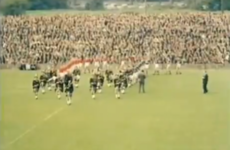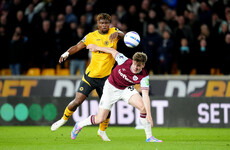WHEN ARTEM LOBOV fights Cub Swanson in the main event at UFC Fight Night 108 in Nashville on 22 April, it will be exactly two years to the day since he sat down for an interview with The42 in which he lamented how his willingness to embrace the toughest challenges was seemingly costing him a place on the UFC roster.
Instead of taking safe fights that were accompanied by little risk, Lobov faced the most difficult opponents on the European circuit and he faced them often — in more than one weight class. It was an approach that left him with a mixed record which wasn’t an accurate reflection of his ability to be competitive at the highest level.
The numbers on his CV deterred the UFC from offering Lobov a contract, so he took matters into his own hands by entering The Ultimate Fighter and reaching the finale. Prior to doing so, Lobov fought nine times in 15 months. Now, it appears that his desire to pursue those tough challenges is finally beginning to pay off.
“To be able to achieve what I have achieved in such a short space of time, this shows that I’m getting the rewards for taking those hard fights all the time,” Lobov (13-12-1-1) told The42 this week, as he continues his preparations in Dublin for next month’s meeting with Swanson.
“That’s what allowed me to develop so quickly as a fighter. I only had my amateur debut when I was 24, which was only about six years ago. That’s how I got my experience, and then I also had the right training partners and the right gym which allowed me to work on my mistakes.”
Two years is a long time in sport, as Lobov has learned, but much can change in 12 months too. This time in 2016, the Straight Blast Gym fighter was contemplating retirement. After coming up short in his UFC debut against Ryan Hall, Lobov delivered a disappointing performance en route to a unanimous-decision defeat to Alex White.
The 30-year-old was subsequently concerned that the UFC would cut him loose instead of giving him an opportunity to make it third-time-lucky. For a while the latter seemed unlikely. Having left his job with Bank of America in September 2014 in order to concentrate full-time on mixed martial arts, Lobov began to weigh up his options again.
“When you lose a fight you go through a very bad time,” he explains. “You’re really down and you’re not really sure where you’re going next. But with me, I always try to be honest with myself so you have to assess the situation and say: ‘Maybe this isn’t for me. Maybe I’m not good enough to do this.’
“Even though I really love doing it and want to continue doing it, you have to admit that maybe it’s time to call it a day and focus your attention on building a different career in something else. I knew I couldn’t fail in this life. Too many people depend on me succeeding. My family members and loads of other people, I owe it to them to make it in life.
“If it wasn’t going to happen in MMA, I would have to make the decision to do it somewhere else. Those thoughts were definitely going through my head but the love of fighting is what kept me in the game. I truly love fighting and I can’t imagine myself retiring. I can’t imagine what it would be like to wake up and not have a fight ahead of me.”
Lobov has never shied away from the fact that his status as a team-mate of the UFC’s biggest star has helped his cause. The rivalry that developed between Conor McGregor and Nate Diaz last year had a knock-on effect for Lobov. A window of opportunity opened, Lobov jumped through and he hasn’t looked back since.
He was given a spot on the UFC 202 card — which was headlined by the rematch of Diaz and McGregor — in Las Vegas last August against Chris Avila, Diaz’s team-mate. Lobov won convincingly to get his first taste of victory in the octagon. A much more impressive performance was to follow three months later when he got the better of Teruto Ishihara in Belfast.
In January, Lobov mentioned Cub Swanson as the type of opponent he’d be eager to test himself against in the future. Having just picked up a big win over the highly-regarded Doo Ho Choi, Swanson (24-7) was looking towards the top contenders in the 145lbs division. But when the 33-year-old American learned of Lobov’s audacious call-out, he responded via Twitter and paved the way for an unlikely match-up.
“He likes to stand a lot,” Lobov says. “He throws a lot, he comes forward, but at the same time he’s quite wild with his shots and very open. He does get hit quite a lot. Even in his last fight, he got hit quite a few times. I just think that this is something I can definitely exploit and use to my advantage. When I connect, guys go to sleep.”
Taking on an opponent of Swanson’s calibre and experience represents a substantial step-up from what Lobov has been accustomed to. The occasion itself will also be bigger than anything he has known before. The fight will headline the card in Nashville in six weeks’ time, despite recent speculation which suggested that the UFC 211 welterweight bout between Demian Maia and Jorge Masvidal would get main-event billing.
Lobov: “The contract that I got said main event but then when these rumours came out it seemed like it wasn’t going to be the main event anymore. But it is. I didn’t really mind anyway. What do I care? I honestly don’t care where I am on the card.
“My contract is the same in terms of payment, whether I’m in the main event or in the first fight of the night. If I’m not the main event, it just means I’m fighting a little bit earlier on the night. That’s the only difference for me. I just wanted the fight. I wanted Cub. As long as I got him, I’m happy.”
Many, including fighters and fans, have criticised the UFC’s decision to grant Lobov an opportunity that his record and ranking — or lack thereof — may not warrant, yet it’s difficult not to applaud the Russian-born fighter’s perseverance and determination to fulfil his objectives. He has pursued them with enthusiasm and his attitude has earned him plenty of admirers too.
Having moved to Dublin with his family when he was 16, Lobov only took up martial arts at the age of 21, having seen an ad for self-defence classes on the Dublin City University campus while studying for a BA in Business Studies and Spanish.
From making his debut in 2010 as a combat novice, to earning a couple of hundred euro for losing to tough opponents in tiny venues, to competing at the top of a bill for the biggest organisation in his sport, the outspoken featherweight admits it’s emotional to reflect on the journey so far.
“For sure,” he says. “It’s been a hell of a ride. I’ve fought some very good guys. Top guys in Europe. Look at what the European fighters are doing in the UFC right now; there are four or five champions and there’s only a handful of Europeans in the UFC. That shows what kind of standard European MMA is at. In terms of the guys that I’ve fought, people often confuse skill and fame. They weren’t famous, but they were very skilful. They were hard fights.
“I’m ready for this. I’m considered a big underdog in this match-up but I’ve been fighting the best of Europe for a very long time. My problem in the past was that the size of my balls didn’t match the size of my skill. I was very green in MMA but I was still ready to take on anyone.
“I paid for that with what you see on my record. But it has prepared me for this main event, I believe. Now that my skill is finally catching up with my attitude, I feel that I’m a huge threat in this division. I’m looking forward to proving that too.”
He adds: “These other guys [fighters], they say nothing, they do nothing and then they expect to get the big fights. You have to go out and put yourself out there. It’s a risk-reward situation. By putting myself out there I get a lot of hate, but ultimately I’m getting the big match-ups.
“As much as people say I’m only getting these fights because of Conor, the UFC aren’t going to put you in a main event just because you’re friends with Conor McGregor. You have to bring something to the table. You have to be a known name and you need to have a certain fighting style that will excite the fans. This is what I have. That’s why I’m in this position.”
Artem Lobov is aiming to strike a balance between his skill and his balls next month in Nashville. Against Cub Swanson he’ll need both.














It needs to be banned immediately. Nash has opened up a can of worms here the GAA don’t seem prepared to deal with. TJ has already joined the party and the rumour is that Tony Kelly has been getting the ball almost into the 6 yard box at trainings down in Clare.
It’s extremely dangerous and anybody arguing otherwise almost certainly hasn’t played in goal or across the full back line. It had better not take sterilised full back or a collapsed throat to get this fixed.
Are u from Clare or something ?? Helmets are already there !! Does this mean u can’t shoot inside the box ?? Other players have been doing it for years and its just because Nash can hit them perfectly people are complaining.
I’m from Dublin, word has it Clare are going to be doing this even worse this year, and Kilkenny and Cork. I’m Sure the Dubs and Tipp and Galway are all lining up someone for it as well. I explained in another post how it’s distinctly different to open field play as the backs and goalkeepers movement and positioning is restricted.
Why don’t we just let them hoist the ball into the box and smack it 2 inches from peoples faces. There has to be a limit, the helmet wont stop broken rib and ruptured testicles. Players need to be given reasonable capacity to protect themselves. That can either take the form of a restricted carry distance or allowing them to rush the striker
It’s one of the most unique and exciting aspects of hurling.. if there are safety issues re players necks, there is nothing stopping neck guards being kept behind the goal, like face-masks are kept for short corners in field hockey.. clip them onto helmets like with ice hockey helmets.
So neck guards and cups for crotch protection. Should they just strap on full body armour to stand in goal? We got by fine for decades but one breach of the honour code has opened up the floodgates on this.
Honour code?.. it’s been done for decades.. DJ Carey was particularly adept at it.. plus penalty takers know there’s a risk of over carrying.. like Nash’s botched drop-shot effort in the final last year.. next up will be a ban on any form of point blank shooting.
It was never to this extent. The issue is that it forces the goal keeper and defenders into the most dangerous possible position on the hurling field, middle distance. In open play point blank shooting is grand because goal keepers and defenders have the opportunity to get into one of several safe positions, behind the man to hook, in close to block, out of the way altogether or far enough away that you can read the flight of the ball and block or dodge. It’s also not possible to get the same kind of power on a shot from open play as from a penalty.
But with these shots you’re too close to dodge or reasonably attempt to protect yourself but you’re not allowed move up to block. The rules force you to be in a position no player would get themselves in in open play because it’s dangerous. If they’re not going to stop the carry then they need to let the keeper and backs rush the striker
What nonsense, I’m surprised at Ger. Bearing in mind you can strike the ball even harder from the hand, does this mean you won’t be allow to shoot inside the box during open play either?
Declan Ryan tipperary and clonoulty-rossmore and former tipp manager was the man who invented the style, it’s a great skill and a penalty is a penalty, Ciaran there would want to cop himself on there and keep his bullshit to himself. That is all